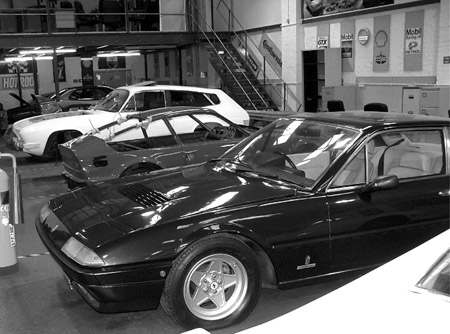
| HOME |
| NERVE |
| REVIEWS |
| ARCHIVE |
| EVENTS |
| LINKS |
| ABOUT US |
| CONTRIBUTORS |
| BACK ISSUES |
| CONTACT US |
Back to index of Nerve 20 - Summer 2012
Dying Art? Not at Basetech!
 Our review
writing team go on a site visit
Our review
writing team go on a site visit
Basetech specialises in revamping classic cars. But this is not all that
is on offer here. It also provides a unique opportunity for out of work
teenagers to learn the 'dying art' of restoring cars, with an emphasis
on hard work and diligence.
We were shown around by Bob, Andrew, and Tony, who made us feel welcome,
explaining to us how Basetech works. Some of the students come from troubled
backgrounds, and one can't help but pick up on the atmosphere of tolerance
and understanding of these issues that seems to prevail with the staff.
Bob said, "We try our best with all of our students and our attendance
record is second to none."
One of the objects of the exercise is to get these students into paid
jobs. In this Basetech has a high success rate.
Well done to all at Basetech. This is a brilliant idea, and it is very
refreshing to find a learning establishment that shows such understanding
when dealing with students that may be experiencing other problems.
But is it art?
This is a question that has been asked a thousand times. Can something functional be a work of art, or is art purely for art’s sake? Basetech certainly has that artistic feel to it. Here you see the cars as they first came in and also as finished products. One can't help but think and compare the skills needed to achieve this with that of an artist. My view is that classic cars are beautiful. The detail, colour and shape reminds me of some modern sculptures. Yes this definitely is art! Pat
Symbiotic Partnerships
We walked into a bright, airy, open, clean and colourful space, with
encouraging slogans and classic car symbols on the walls. This is Basetech,
where young people aged 16-19, who have missed out on education and opportunities,
are taught the practical skills of servicing and repairing car engines,
in particular Classic cars.
This is a fraction of what they learn however. Here the staff help and
support their students to develop themselves, their self-confidence and
self-discipline.
The team who run this co-operative business are a special bunch; some
have survived severe experiences such as a criminal past and time in prison,
or come unstuck and taken wrong turnings in life, all of which they related
openly and with humour. All this, and their symbiotic partnership, enables
them to understand and relate to the often angry, fearful or confused
young people who join Basetech's training.
Students are treated with respect, often a new experience for some of
them; at the same time dodgy behaviour is challenged and staff take no
shit off anyone; but for someone who has a problem, the support and care
is there.
We were given the chance to talk to some trainees, and I wish we had spent
more time with them and asked better questions: their calm confidence
was impressive.
We were made very welcome, given lifts and lunch. This was an inspiring
visit: Basetech is far more than a training centre; it feels like a community
which cares for all its members, based on hard work and humour. Sue
Motor-vation
Modern cars have bolt-on, switch easy, purpose packaged parts to replace
worn and damaged components that can be fitted before you can say Qashqai
(or as people in Woolton pronounce it, Cash Cow). So why teach young people
about araldite, differentials, or how a Wankel engine works?
Well, Basetech is not about trying to compete with the Computer Aided
Design of the car industry. The aim here is to give a grounding in hands-on
practical skills, building motivation from the ground up.
As someone who served a traditional engineering apprenticeship, I can
appreciate this approach. The day to day of working to a design brief
and shaping something almost from scratch right through to the end product
gives a lasting satisfaction.
As we enter a phase of economic uncertainty, where innovation will be
needed to survive, this development of practical skills, self belief and
confidence to adapt to the changing climate will be of priceless benefit.
Ritchie
Thanks to Pat for arranging the visit.